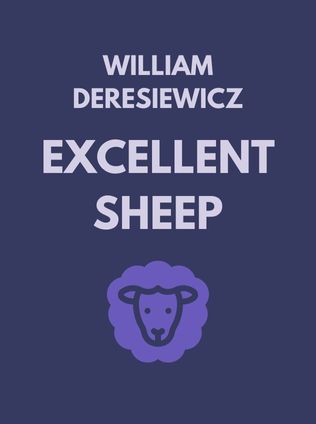
Excellent Sheep
The Miseducation of the American Elite and the Way to a Meaningful Life
By William Deresiewicz
Published 08/2014
About the Author
William Deresiewicz is a prominent critic of higher education in America, widely recognized for his incisive analysis of elite institutions. A former English professor at Yale, Deresiewicz first captured public attention with his 2008 essay, “The Disadvantages of an Elite Education,” which resonated deeply with readers and sparked a national conversation. Building on the ideas he introduced in that essay, he wrote Excellent Sheep: The Miseducation of the American Elite and the Way to a Meaningful Life in 2014. The book draws from his 15 years of experience at Ivy League schools, extensive historical research, and numerous conversations with students. Deresiewicz’s work challenges the status quo, calling for a radical rethinking of how we approach higher education in America.
Main Idea
Excellent Sheep argues that elite colleges and universities in the United States are failing their students and society at large. These institutions, according to Deresiewicz, are overly selective, profit-driven, and more focused on maintaining their prestige than providing a quality education. This selectivity perpetuates social inequality and deprives students of a meaningful educational experience, one that should ideally nurture self-insight, character development, and the skills necessary to uphold democracy. The book is both a critique and a call to action, urging a reformation of the higher education system to prioritize accessibility, true learning, and the development of well-rounded individuals who can contribute positively to society.
Table of Contents
- What Is a High-Quality College Education?
- Selective Admissions: Perpetuating Inequality
- The Impact on Students: Fearful Followers
- The Role of Elite Colleges in Society
- Proposed Solutions: Reforming Higher Education
- Creating a Meaningful College Experience
What Is a High-Quality College Education?
According to Deresiewicz, the ideal college experience goes beyond mere academic instruction; it should be a transformative journey that cultivates self-insight, builds character, and equips students with the skills necessary to participate meaningfully in democracy. He advocates for a liberal arts education as the best model for achieving these goals. Unlike programs that focus primarily on career development, the liberal arts prioritize broad-based learning and character development. This approach encourages students to explore a wide range of subjects, from literature to biology to history, fostering a well-rounded perspective and a deeper understanding of themselves and the world around them.
The Importance of Self-Insight
Deresiewicz argues that self-insight is the cornerstone of a meaningful life. By understanding their values, desires, and needs, students can build a life that aligns with their true selves. Liberal arts education facilitates this process by encouraging reflection and critical thinking. Through the study of diverse subjects and engagement with different perspectives, students are prompted to question their long-held beliefs and develop a more nuanced understanding of who they are.
Sign up for FREE and get access to 1,400+ books summaries.
You May Also Like
The Subtle Art of Not Giving a F*ck
A Counterintuitive Approach to Living a Good Life
By Mark MansonRich Dad Poor Dad
What the Rich Teach Their Kids About Money - That the Poor and Middle Class Do Not!
By Robert T. KiyosakiHow To Win Friends and Influence People
The All-Time Classic Manual Of People Skills
By Dale CarnegieFreakonomics
A Rogue Economist Explores the Hidden Side of Everything
By Steven D. Levitt and Stephen J. DubnerI Am Malala
The Story of the Girl Who Stood Up for Education and Was Shot by the Taliban
By Malala Yousafzai



















